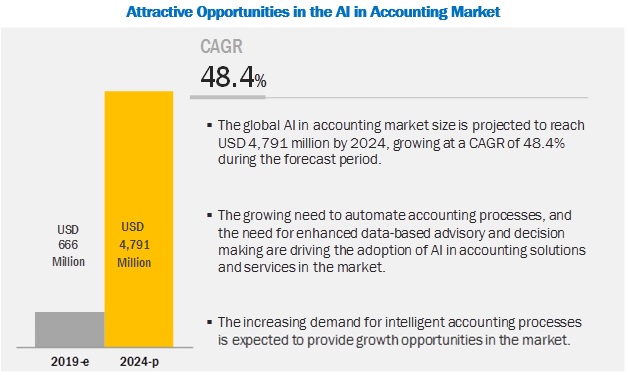Artificial Intelligence (AI) in accounting is the integration of AI technologies with accounting functionalities to automate repetitive and mundane tasks, reduce accounting inconsistencies, and move the accountants to advisory roles. Accountants and accounting departments are integrating AI capabilities in their accounting processes, such as bookkeeping, invoice classification and approvals, contract interpretation, reporting, tax and revenue filing, fraud detection, and expense auditing and management. AI has the capability to fetch critical business insights from a huge pile of accounting data. The integration of AI in accounting processes can provide better and cheaper data to support decision-making, generate new insights from data analysis of data, along with providing free time to focus on more valuable tasks, such as decision-making, problem solving, advising, strategy development, relationship building, and leadership.
MarketsandMarkets expects the global Artificial Intelligence in accounting market to grow from USD 666 million in 2019 to USD 4,791 million by 2024, at a Compound Annual Growth Rate (CAGR) of 48.4% during the forecast period.

The fraud and risk management application segment is expected to grow at the highest CAGR during the forecast period. Companies are leveraging AI in accounting to anticipate and proactively manage fraud and risk ensuring data security and power their organizations’ performance. With AI, fraud detection models can become more robust and accurate. If an AI-based accounting system finds something as a potential fraud and a human determines it as not a fraud because of some parameters, the Ai-based system learns from those human insights, and will not send a similar detection in the future. As the AI-based fraud management system learns, it will be able to detect a more complex fraud, an advantage that may have the biggest impact on risk management. This technology has the capability to enhance the accuracy and protection of financial data. With the rapid increase in data-based frauds, vendors in the AI in accounting market will focus on integrating AI for fraud and risk management segment, which will increase their market share.
The Natural Language Processing (NLP) technology segment is expected to grow at the highest CAGR during the forecast period. With an increase in the amount of accounting data, data management will become a challenge for accounting departments. One of the core concepts of NLP is the ability to understand human speech. It would be simply impossible to implement voice control over different systems without NLP. Moreover, NLP allows users to integrate, not only voice understanding into devices and sensors, but also localization features, leading to creative translation. The application of NLP includes machine translation, information extraction, report generation, question answering, acquiring data providing context, and identifying the intent of the user. In accounting, NLP finds applications in the areas of invoice classification and interpretation and contract interpretation, among others. With the increasing variation in contract and invoice languages and formats, major AI in accounting vendors are focusing on offering NLP integrated solutions. With the strengthening regulatory and compliance landscape for data, the NLP technology in the AI in accounting market is growing at a significant rate.
In terms of geographic coverage, the AI in accounting market has been segmented into 5 regions, namely, North America, Asia Pacific (APAC), Europe, Middle East and Africa (MEA), and Latin America. APAC is expected to record the highest growth rate during the forecast period. This growth can be attributed to the increasing government investments and funding, growing number of startups venturing in this market space, governments’ core focus on integration of technologies to enhance back-end business processes, and various use cases in AI in accounting in the region.
The rigid and rule-based software currently governs most of the accounting processes. This approach offers limited abilities to handle critical problems. AI tools can help enterprises in overcoming such challenges with self-learning algorithms, which can reveal new patterns and solutions. Meanwhile, employees can be assigned to more engaging and strategic tasks such as data analysis providing data-based insights to the decision makers. AI in accounting solutions are catching pace in multiple applications, such as automated bookkeeping, invoice analysis and classification, regulatory and compliance management, reporting, and contract interpretation. The increasing demand for intelligent accounting processes and growing focus on Research and Development (R&D) to integrate AI in accounting, are expected to open new opportunities in the AI in accounting market.

